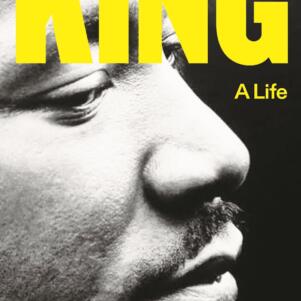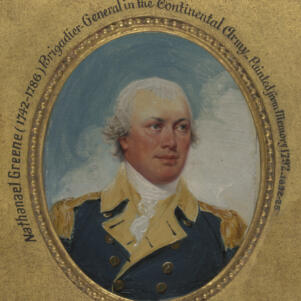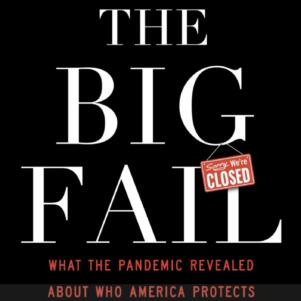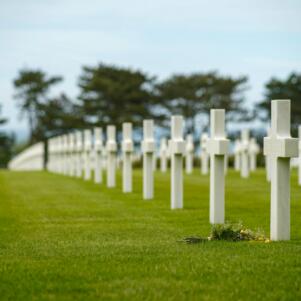Hanukkah’s origins spring from a restoration of faith
By Lizzie Short | December 8, 2015, 5:00 EST
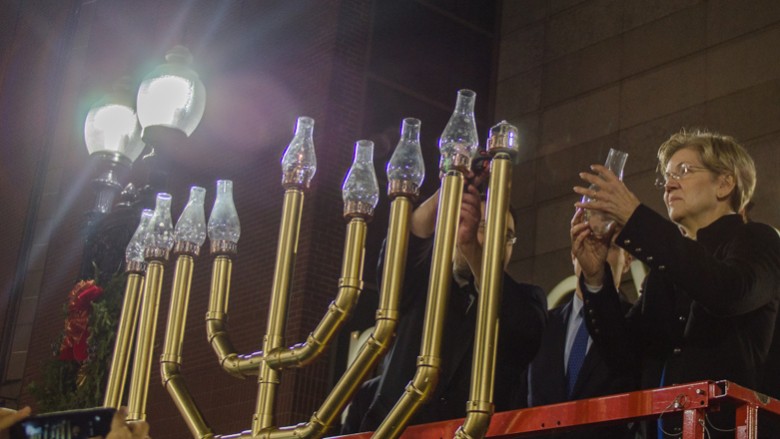 U.S. Senator Elizabeth Warren helped light Boston’s official menorah at Downtown Crossing on Sunday. (NewBostonPost photo by Beth Treffeisen)
U.S. Senator Elizabeth Warren helped light Boston’s official menorah at Downtown Crossing on Sunday. (NewBostonPost photo by Beth Treffeisen) In America, Hanukkah is one of the better-known and commonly celebrated Jewish holidays, with menorahs popping up this time of year in Boston and cities all over the nation. As children, Jews learn the miraculous story of Hanukkah and of those who fought oppressors in the Holy Land thousands of years ago.
But the story isn’t found in Hebrew scriptures. In fact, they don’t mention Hanukkah at all.
The first reference to Hanukkah comes from the First Book of the Maccabees, a Hebrew account written in Greek some 2,100 years ago. At the time, Syrian Greeks, who were formerly part of Alexander the Great’s empire, ruled Israel.
Greek culture had by then begun to shape Jewish views, and many Jews, especially the wealthy, were attracted to Hellenistic beliefs, values, and philosophy. And who can blame them? This period saw advances in geometry, astronomy, literature, architecture, and philosophy – all under Greek auspices.
Ultimately, Jewish practices began to reflect Greek cultural and religious influences: Greeks and Hellenized Jews outside of Jerusalem gave the Hebrew God a Greek name, and some sacrificed pigs, which Israelites regarded as unclean, on holy stones that symbolized the presence of God. When a Jewish high priest requested and received a decree from the Greek king to prohibit the practice of Jewish, or Mosaic, law and the king ordered the worship of Greek gods, some Jews had had enough
Provoked once too often, the Maccabee family led a revolt, headed by its patriarch, Mattathias, and five of his sons. One, Judah, a master of guerilla tactics, became the army’s leader and captured Jerusalem about 2,180 years ago. The Maccabees purified the city’s temple and began offering a daily morning sacrifice. For eight days, they celebrated the dedication, or Hanukkah, of the altar. These days are remembered annually by celebrating Hanukkah, a festival of lights that commemorates the military, religious, and cultural victory of the Maccabees.
But the victory was short-lived, at least militarily. A series of counter-revolts and reversals of fortune prevented Jews from maintaining military power in the area, and they were eventually conquered by Roman invaders.
A Jewish historian, Josephus, wrote an account of Hanukkah almost 2,000 years ago. He describes the celebration as a festival that features feasts, sacrifices, lighted candles, and hymns to God for eight days. Josephus speculates that the event is called a festival of lights because “this liberty beyond our hopes appeared to us,” meaning the Maccabeean victory over Jerusalem’s Greek rulers.
The Hanukkah story most are familiar with – the tale of the one-day’s supply of consecrated oil that kept the interior lamps lit for eight days, the time it took to restore the temple – wasn’t recorded until about 600 years after the Maccabees, in the Talmud, a collection of rabbinic writings, laws and meditations on other Hebrew documents. The miraculous event in this version is the long-lasting oil – not the unlikely military victory – and is symbolized in the menorah, the most-recognized aspect of Hanukkah.
The festival of lights has been celebrated for centuries, but only reached its current level of popularity in the mid-20th century. Hanukkah celebrations had been on the rise since the 1920’s, but gained greater prominence in post-war America.
“In America, it has become the focus of an all-out attempt by Jewish parents to reduce their children’s ‘outsider’ status at Christmas time,” Irving Greenberg, a Jewish scholar and rabbi, wrote about Hanukkah.
As Christmas has become ever more commercialized, it is understandable that this festival of lights has been used to balance the cultural weight of the Christian commemoration of the birth of Christ. And given Hanukkah’s themes of restoring Hebrew practices and religious institutions in the face of another powerful culture, its celebration clearly befits the joyous tenor of the American holiday season.
RELATED:
Gallery: Menorahs spread their light across Boston
NBPPluralism

